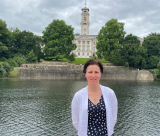
How your small change can help save lives
January 18th, 2013
Staff donations through the Small Change: Big Impact scheme will this year support the University’s research into the early detection of cancer.
The net monthly pay of staff who subscribe to Small Change: Big Impact is rounded down to the nearest pound, with the pennies automatically going to a project supported by the University’s Impact Campaign.
Last year the initiative supported HeartLight, a sensor developed at the University which monitors the heartbeat of newborn babies. The pennies collected from the pay packets of more than 500 staff resulted in around £300 a month being donated to HeartLight by the end of 2012. Many staff have also chosen to continue their support for HeartLight by setting up a monthly direct debit.
Following a consultation with staff towards the end of last year, Cancer: Early Detection was overwhelmingly chosen as the 2013 beneficiary of Small Change: Big Impact.
Like HeartLight, Cancer: Early Detection is one of the projects supported by Impact: The Nottingham Campaign, which aims to raise £150m over five years in aid of projects that will change lives, tackle global challenges and shape the future.
Cancer: Early Detection will have a genuine impact on the quality of life of patients in the UK and worldwide and will save more people who might otherwise die from cancer.
By 2030, cancer cases are expected to have doubled worldwide. The most common forms of cancer are lung, breast, colon, stomach, prostate and liver. For lung, breast and colon cancer, early detection and treatment significantly reduce mortality.
In 2011, the University established the world’s first Centre of Excellence for Autoimmunity in Cancer (CEAC). Here researchers are developing blood tests for early detection of cancer by looking for antibodies produced by an individual’s immune system in response to cancer.
Early detection blood tests can detect breast cancer up to four years earlier than a mammogram and can detect lung cancer significantly before patients present with symptoms.
Professor John Robertson, Director of CEAC and Professor of Surgery, said: “We’re delighted that Cancer: Early Detection has been chosen to receive support from across the University community.
“Early detection is the Holy Grail of cancer treatment and we plan to use the technology to identify autoantibodies that are present in breast cancer before rolling this out to tackle other solid cancers.
“We need to raise significant funds to enable us to exploit this research to maximum potential and have a real impact on cancer sufferers worldwide.” It is hoped that staff will continue to be as generous in supporting Cancer: Early Detection as they were in giving up a few pennies every month in aid of HeartLight.
Simon Buttenshaw, Head of the Campaign’s Regular Giving team, said: “The response from staff to Small Change: Big Impact in its first year has exceeded all expectations.
“It’s difficult to check, but I have a good feeling that it is the biggest payroll-giving initiative of any UK University, in terms of numbers signed up. I’m incredibly pleased to see so many staff wearing the distinctive donor pin badges, because we knew when we launched Impact: The Nottingham Campaign that success would only come if it was supported across the whole University community: alumni, students and staff.”
If you have already signed up to Small Change Big Impact, donations will automatically continue, but from January’s pay packet will now go to Cancer: Early Detection.
If you wish to sign up to Small Change Big Impact, and help save lives by supporting research into the early detection of cancer, please do so via the staff portal, click into the Other Services tab and follow the instructions.
Tags: Cancer: Early Detection, Centre of Excellence for Autoimmunity in Cancer (CEAC), Director of CEAC, HeartLight, Professor John Robertson, Small Change Big Impact
Leave a Reply
Other Research

Welcome to Associate Pro-Vice-Chancellor for Researcher Academy and Research Culture Development
Professor Jeanette Woolard has been appointed as Associate Pro-Vice-Chancellor for the Researcher Academy and Research Culture Development. […]

Strong research funding performance is a fantastic achievement
Professor Tom Rodden’s research update I am delighted to report that the University of Nottingham is […]

